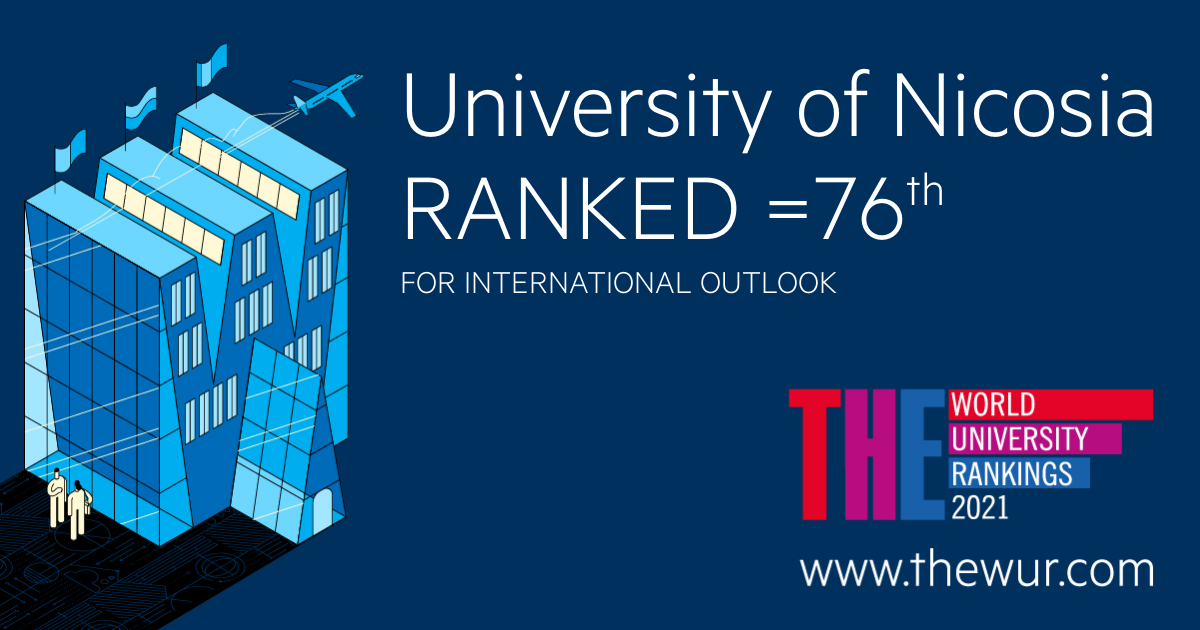University of Nicosia Reaffirms its Global Standing with THE World University Rankings 2021
Ranking among the Top 801-1000 universities in the World and Top 250-300 in Europe
The latest edition of the Times Higher Education (THE) World University Rankings has reaffirmed the University of Nicosia’s (UNIC) global standing, ranking it among the top 801-1000 universities in the world. Correspondingly, UNIC ranks among the Top 300 universities in Europe.
The THE World University Rankings (WUR) are possibly the best-known university rankings in the world. The expanded THE WUR 2021 edition includes over 1,500 ranked research-intensive universities, out of 25,000 universities globally, that met the THE eligibility criteria and applied for assessment.
“We have been driving educational innovation in the wider region for some time now. These efforts and our overall high-quality position are continuously being reaffirmed by the major rankings and university rating agencies”, noted Professor Philippos Pouyioutas, Rector of the University.
Along with its inclusion in the Top 1000 THE WUR table, UNIC has also been recognised by the QS World University Rankings (number 106 in Emerging Europe and Central Asia Region) and the Times Higher Education Impact Rankings (number 42 in the world in the core area of Quality Education). The latter are the first to measure the success of universities in delivering the UN Sustainable Development Goals (SDGs).
UNIC was also notably awarded a 5-Star Institutional Rating by the QS Intelligence Unit in its 2020 audit, joining an exclusive group of only 50 other universities globally. In addition to its exemplary overall standing, UNIC received the highest possible (5-Star) rating in the following key categories: Teaching, Employability, Online Learning, Internationalisation, Inclusiveness, and Facilities

One of the core areas in which the University excelled in this year’s expanded 2021 WUR edition is International Outlook, where UNIC ranked 76th worldwide.
“Achieving this outstanding position is a testament to our innovative internationalisation strategy and especially to our notable success in offering cross-border education”, underscored Mr. Antonis Polemitis, CEO of the University.
On his part, the Rector stood especially on the University’s pioneering work in Online/Distance Learning, supporting both its own degree programmes, as well as the joint degrees offered in collaboration with other reputable universities. “This includes offering globally unique programmes of study such as the MSc in Digital Currency, the MSc in Computational Design and Digital Fabrication [in collaboration with the University of Innsbruck] and, more recently, the MSc in Data Science”, he added.
In this respect, UNIC was the first university in the EU (and among only 14 universities to date worldwide) to be awarded a 5-Star rating for Online/Distance Learning in 2017, with the QS Intelligence Unit reaffirming this exemplary rating in the 2020 re-audit.
More generally, internationalisation is a central component of the University of Nicosia strategy, resulting in a series of pioneering initiatives. Notable initiatives include the establishment of the first and largest medical school in Cyprus, in 2011, in partnership with St George’s, University of London. This first of its kind partnership with one of the UK’s premier medical schools attracts students from the USA, Canada, the UK, Australia, New Zealand, Israel and Lebanon. The University of Nicosia Medical School has since established global partnerships with renowned clinical hospitals in Chicago, Baltimore, Tel Aviv and Barnsley. A tremendous testament to its international standing today is the fact that its cohorts have an unparalleled 99% placement rate at top hospitals, including Oxford, Harvard and Mount Sinai.
UNIC also stands out for a number of global university firsts in its dynamic initiative in digital currencies and blockchain technology, among which, being the first university in the world to: (a) offer a course and Master programme in the field; (b) deliver graduates from a programme of this type; and (c) publish academic certificates and diplomas on the blockchain. These developments put the University well ahead of the curve, before even Ivy League universities in the US properly entered the fray. The statistics here are telling, with the University’s free online “Introduction to Digital Currencies” MOOC having been followed by over 38,000 students from 100 countries across all continents since 2014. Moreover, graduates of UNIC’s MSc in Digital Currency have been involved in leading blockchain organisations worldwide.
“UNIC is linked with remarkable employers in the US, the UK and Western Europe, particularly in the aforementioned areas of medicine and blockchain, who are aggressively recruiting our graduates”, added Mr. Polemitis, pointing to the high employability of UNIC graduates more broadly, as well as to their global imprint in a variety of professions, across many sectors. These linkages extend to industry stakeholders, professional associations and supranational bodies spanning the globe. In this regard, UNIC is currently leveraging its know-how in blockchain education and research as a core partner in the renewed consortium now operating the EU Blockchain Observatory and Forum. “In this way, we are acting as advisor to the European Commission in shaping Europe’s blockchain future”, remarked Mr. Polemitis.
“Inclusion in the Top 1000 Times Higher Education table, and among the top 300 universities in Europe, is another strong endorsement of the overall quality of our University, and an acknowledgment of our dedicated and pioneering efforts. Indeed, our continued successes in international rankings represent milestones in our continuing journey, across which we benchmark ourselves to other leading global universities”, underlined Professor Pouyioutas.
“Ultimately, we are delighted to provide prospective students from Europe and beyond, the opportunity to study on campus and online at one of the best universities in the world”, concluded Rector Pouyioutas.

